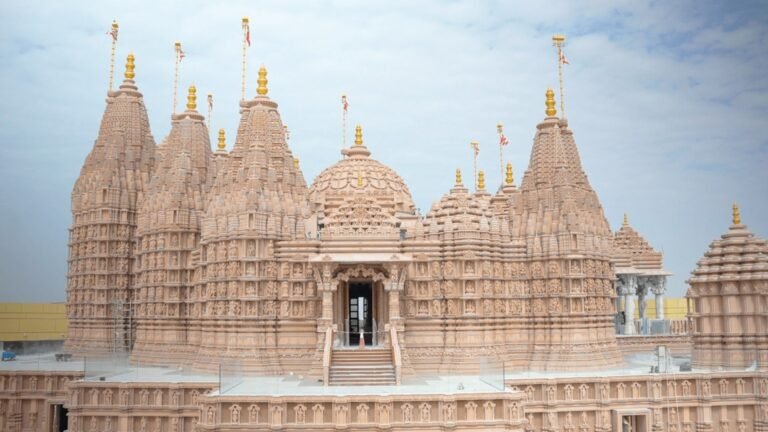On Wednesday, Indian Prime Minister Narendra Modi will inaugurate the BAPS Swaminarayan Mandir, an expansive Hindu temple in Abu Dhabi, UAE.
From March 1 onwards, the temple will be accessible to the general public. PM Modi expressed his enthusiasm for participating in the Ahlan Modi programme, an event bringing together the Indian diaspora residing in the UAE.
Modi is also scheduled to address the ongoing World Government Summit later today
“I shall be elaborating on a wide range of subjects, which will strengthen the conversations around building a better planet,” he conveyed via an X post.
Welcoming Modi, Sheikh Hamdan bin Mohammed bin Rashid Al Maktoum, Crown Prince of Dubai and Chairman of The Executive Council of Dubai, stated: “The strong ties between our nations serve as a model for international cooperation. The World Government Summit has evolved into one of the world’s leading platforms for sharing governance best practices, success stories and initiatives, and envisioning the future of government. It is a pleasure to have India as a distinguished guest at this international event, where it will showcase its innovations, initiatives and projects across diverse sectors that are a model for accelerating development for government service delivery.”
Prime Minister Narendra Modi will lead a dedication ceremony to inaugurate the first Hindu temple in Abu Dhabi on Wednesday.
According to Arabian Business, BAPS Swaminarayan Sanstha constructed the temple on a 27-acre site near Abu Dhabi.
Featuring over 25,000 pieces of stone from Rajasthan and Gujarat, the temple incorporates pink sandstone shipped from northern Rajasthan for the facade. They repurposed wooden trunks, initially used for stone transport, into furniture.
A Marvel of Architecture and Symbolism: Exploring the Intricacies of the Temple Complex
An amphitheater shaped like a ghat from Varanasi, with streams representing the Ganga and Yamuna rivers, adjoins the temple. A light symbolises the Saraswati river, forming a ‘Triveni’ Sangam.
The temple accommodates seven shrines for deities from across India, including Ayyappa, Balaji, Jagannath, Krishna, Hanuman, Shiva, and Ram. Carvings depicting the lives of the deities adorn each shrine.
The temple’s dome showcases the five natural elements – earth, water, fire, air, and space. Animal carvings, including horses and camels representing the UAE, are uniquely crafted.
The complex encompasses visitor and learning spaces, prayer halls, exhibits, sports areas, gardens, and shops.
Over 350 sensors monitor temperature, pressure, and seismic activity. Sustainable practices involving fly ash contribute to lowering the temple’s carbon footprint, while special tiles maintain comfort in the heat.

